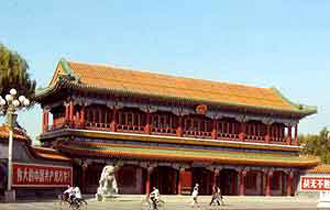China’s accelerated manned-moon-shot program, the acquisition of status car brands, the fleet of aircraft carriers under construction and its recent tendency to openly snipe at the U.S. through diplomatic and mass-media channels — they all point to a surge in testosterone levels.
I mean testosterone literally as well as in the figurative sense with which that androgen is commonly used as a metaphor for aggression, and even a reckless sense of confidence.
Some important factors are fueling the rise. As any endocrinologist knows, the most important and reliable ways to raise testosterone levels are to reduce stress and to enjoy success. In the past three decades China’s population has experienced a dramatic stress reduction in not having to worry about the most essential necessities of life: food, housing and a nifty cell phone. That same economic engine has allowed it to enjoy the empowering success of 10% average economic growth for the past two decades, with a low of 7.1% in 1999 and a high of 14.2% in 1992.
To put the psycho-social impact of that kind of growth in perspective, we Americans were going nuts with monster chrome-plated SUVs and 6,000 square-foot homes after just a half dozen years of 4% growth in the 1980s and the first half of the 2000s.
The other factor contributing to China’s surging testosterone levels is the sense of being the lone giant among the world’s few prospering societies. With the U.S. and Europe trying to get traction after a cataclysmic blowout and Japan still struggling to pull itself out of a two-decade contraction, there’s no economic rival in sight. Germany is doing fairly well, but its economy is half the size of China’s and it’s growing only 1.5% when adjusted for inflation — a quarter of China’s real economic growth. India is enjoying growth in the 8% range, but the majority of its 1.3 billion are living at subsistence levels, with a poverty rate of over 35%. The GDPs of a handful of other nations that are enjoying strong growth would round off China’s figure.
So as the Chinese survey the world they would be hard pressed not to feel a deep sense of self-satisfaction, if not smugness. People in that frame of mind are not given to heeding the dictates of other nations, especially ones that owe them two trillions of dollars and are in danger of defaulting on national debt because their political system allows leaders to play chicken with economic stability in hopes of eking out political advantages in an election year. A China in that frame of mind will no longer tolerate censure or even gentle political pressure, even if it’s well intentioned.
In fact, a nation feeling its oats is likely to start offering unsolicited advice to other nations it deems its economic inferiors. Japan did that during the late 1980s as the U.S. was reeling from a staggering national debt and high unemployment caused by a rusting industrial belt battered by Japanese imports. The U.S. was doing that to China throughout the past forty years or so as it shook its head with contempt at China’s seeming inability to put two cars in every garage — or even to build homes with garages for that matter.
And now China has begun doing that. The most flagrant example is Gen. Chen Bingde’s rant to his S. Korean counterpart about U.S. efforts to minutely orchestrate protocol for the return visit by Adm. Mike Mullen. The same Chen had just a few days earlier let Mullen know that he felt the U.S. was spending too much on its military in view of the nation’s economic and budgetary plight. Chen didn’t really have to say those things, but he felt he was in a position to say them, and being human, did.
China and its officials will be increasingly in that frame of mind as its economy continues rising and its military continues adding impressive white elephants to its arsenal. And of course the world’s media, which is already attuned to everything China, will faithfully report each one of these pronouncements just as they had those emanating from American heads. That big new voice will cast world affairs in a light to which the world is still unaccustomed after a century of listening to the U.S. as the biggest voice. It will be interesting to see how much grace we Americans can muster while we await the far-off but inevitable end to China’s top-of-the-world moment.

